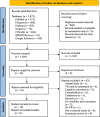Virtual reality-based interventions for the rehabilitation of vestibular and balance impairments post-concussion: a scoping review
- PMID: 36869367
- PMCID: PMC9985280
- DOI: 10.1186/s12984-023-01145-4
Virtual reality-based interventions for the rehabilitation of vestibular and balance impairments post-concussion: a scoping review
Abstract
Background: Concussions and mild traumatic brain injuries are the most common causes of physical and cognitive disability worldwide. Concussion can result in post-injury vestibular and balance impairments that can present up to five years post initial concussion event, ultimately affecting many daily and functional activities. While current clinical treatment aims to reduce symptoms, the developing use of technology in everyday life has seen the emergence of virtual reality. Current literature has failed to identify substantial evidence regarding the use of virtual reality in rehabilitation. The primary aim of this scoping review is to identify, synthesise, and assess the quality of studies reporting on the effectiveness of virtual reality for the rehabilitation of vestibular and balance impairments post-concussion. Additionally, this review aims to summarise the volume of scientific literature and identify the knowledge gaps in current research pertaining to this topic.
Methods: A scoping review of six databases (PubMed, Embase, CINAHL, ProQuest, SportDiscus, Scopus) and a grey literature (Google Scholar) was conducted using three key concepts (virtual reality, vestibular symptoms, and post-concussion). Data was charted from studies and outcomes were categorised into one of three categories: (1) balance; (2) gait; or (3) functional outcome measures. Critical appraisal of each study was conducted using the Joanna Briggs Institute checklists. A critical appraisal of each outcome measure was also completed utilising a modified GRADE appraisal tool to summarise the quality of evidence. Effectiveness was assessed using calculations of change in performance and change per exposure time.
Results: Three randomised controlled trials, three quasi-experimental studies, three case studies, and one retrospective cohort study were ultimately included, using a thorough eligibility criteria. All studies were inclusive of different virtual reality interventions. The ten studies had a 10-year range and identified 19 different outcome measures.
Conclusion: The findings from this review suggests that virtual reality is an effective tool for the rehabilitation of vestibular and balance impairments post-concussion. Current literature shows sufficient but low level of evidence, and more research is necessary to develop a quantitative standard and to better understand appropriate dosage of virtual reality intervention.
Keywords: Balance; Concussion; Vestibular; Virtual reality.
© 2023. The Author(s).
Conflict of interest statement
The authors declare that they have no competing interests.
References
-
- Sessoms PH, Fraser JJ, Bodell DM, Haluch KS, Markham AE, Brookfield JS, Jameson J, Gottshall KR. Clinical effectiveness of virtual reality versus conventional clinic-based vestibular physical therapy on balance and function in active duty service members. A pilot randomized controlled trial. Virtual Real. 2021 doi: 10.1007/s10055-021-00546-x. - DOI
Publication types
MeSH terms
LinkOut - more resources
Full Text Sources
Medical


